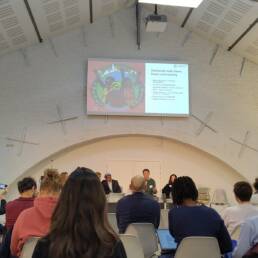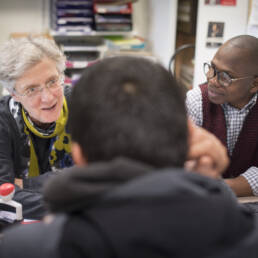Author
Silvia Sinibaldi
Humanitarian Director
Tel: +32 (0)2 235 03 95
Mob: +32 (0)478 58 54 08
ssinibaldi@caritas.eu
Recent cases of allegations and convictions of sexual abuses especially, but not exclusively, in the development and humanitarian sectors, cast a shadow on the precious work of relief implemented by NGOs and faith based organisations all around the world.
These appalling episodes have given us the opportunity to deepen Caritas reflections on how to mainstream safeguarding in a swift and effective way. Our first priority is to make sure Caritas is a safe environment for all. The people we serve are at the core of our actions and concerns. Caritas leadership, governance, staff and volunteers unitedly contribute to this joint commitment.
The EU-funded TEACH project aims to strengthen the technical capacities of its partners in different areas related to humanitarian aid and volunteer management. Safeguarding has been among its core topics since the very first concept note, back in 2017. In January 2020, participants from six different Caritas agencies, which are partners of this project, participated in a training on how to manage investigations related to allegations linked to possible
safeguarding breaches. The organisations whose staff participated in this training, i.e. Caritas Austria, Caritas Czech Republic, Caritas Europa, Caritas Romania, CAFOD and Trócaire, have already adopted relevant policies and tools (safeguarding of children and vulnerable adults, code of ethics, code of conduct, anti-harassment policies, feedback mechanisms). Caritas Europa was happy to publish on its website all relevant information about internal complaints handling mechanisms as well as those from some of its member organisations.

It is fundamental to make sure feedback tools are known and accessible to everyone. Once a complaints is received, we commit to acknowledge to the complainant with the shortest delay. The type and nature of the complaint will establish how to further proceed in dealing with it. In case the allegation is considered to be sensitive, a complaints handling committee will proceed with the set-up of an independent and confidential investigation. The training on how to carry out such investigations took place in Brussels from 7 to 9 January, facilitated by an experienced external consultant. It was considered to be a very successful and informative moment, gathering more than 20 staff from different departments, depending on the structure of each organisation.
The whole Caritas Europa Secretariat is glad to undertake a safeguarding training at the end of the month, on 30– 31 January. It is going to be a precious moment of reflection to set up a common solid basis and to be able to look at our actions through “the lens of safeguarding”. In fact, while not having direct contact with the people we serve, we acknowledge safeguarding and protection mainstreaming are a shared responsibility for all.
Safeguarding will continue to be a top priority for Caritas Europa in the time ahead. A new Task Force has recently been established to support us in continuing our efforts to further strengthen safeguarding within our network.












